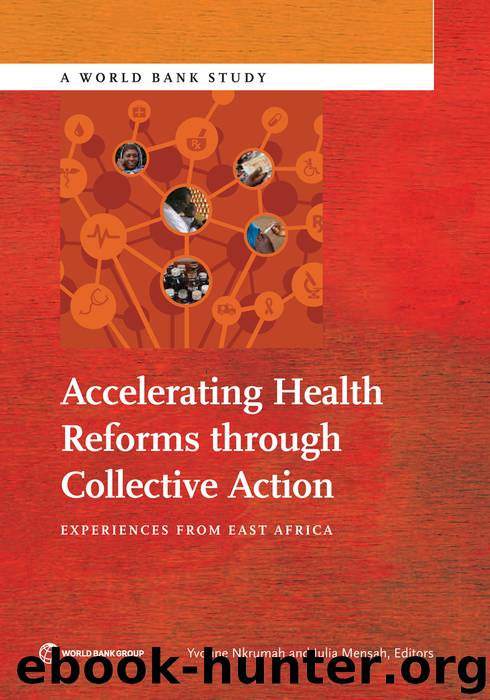Accelerating Health Reforms through Collective Action by Yvonne Nkrumah

Author:Yvonne Nkrumah
Language: eng
Format: epub
Publisher: World Bank Publications
Health Sector Hurdles and Opportunities
Uganda’s health system faces a variety of challenges. Three core issues reflected in the current Health Sector Strategic Investment Plan (HSSIP) are as follows: (i) access to essential medicines; (ii) human resource constraints, and (iii) health care financing.
Access to Medicines: Access to essential medicines is an important priority for the Ugandan government. The National Health Plan seeks to “ensure that essential, efficacious, safe, quality and affordable medicines are available and used rationally at all times in Uganda”. Achieving this goal requires, among other things, the suitable pricing of essential medicines at public facilities to ensure that the poor can obtain lifesaving medicines; strengthening of the supply chain to ensure that medicines are readily available to meet patients’ needs; the development and maintenance of infrastructure to transport and store medicines in line with international best practice; and the training of a workforce to manage the pharmaceutical supply chain.
Despite recent reforms to enhance access to essential medicines, the health sector still faces significant challenges, including high stock-out rates in public health facilities—with an average duration of 72.6 days compared with 7.6 days in mission facilities (HSSIP). The HSSIP indicates that only 30 percent of the Essential Medicines and Health Supplies list required for the basic health package is provided for in the national budget; global initiatives provide the bulk of resources needed for malaria, human immunodeficiency virus (HIV) and acquired immune deficiency syndrome (AIDS), tuberculosis, vaccines, and reproductive health. Delays in procurement, poor record-keeping, and poor quantification and late orders by facilities contribute to a waste of medicines in the public sector. The cost of medicines also remains too high for many citizens—particularly the poor. Medicines in private facilities are estimated to be 3–5 times more expensive than in public facilities.
Human resource constraints: Like many developing economies, Uganda lacks an adequate, skilled health care workforce to support a growing disease burden. The 2012–13 Report of the Parliamentary Committee on Health indicates a doctor-to-patient ratio of 1:24,725 and nurse/midwife-to-patient ratio of 1:11,000. On average, Uganda has a health worker to patient ratio of 1:818 compared with the World Health Organization (WHO) benchmark of 1:439 (Namaganda, McMahan, and Oketcho 2012). The report also shows that only 58 percent of health care positions are filled: Absenteeism and the inability to retain health workers—particularly at the lower levels of care—are contributing factors.
Health Financing: Out-of-pocket health care financing represents 54 percent of total health expenditure in Uganda (MeTA 2010; Parliament of Uganda 2013). The government makes a contribution toward the delivery of health care services; however, the budget allocation for the health sector is significantly below the threshold of 15 percent stated in the Abuja Declaration. In the 2013–14 fiscal year, for instance, Uganda allocated 8.7 percent of the national budget to health (directly through the MoH).
The proportion of the population covered by some form of health insurance is also very small, at 3 percent (United Nations 2004), meaning that payment for health care is made at the point of need. Given the
Download
This site does not store any files on its server. We only index and link to content provided by other sites. Please contact the content providers to delete copyright contents if any and email us, we'll remove relevant links or contents immediately.
International Integration of the Brazilian Economy by Elias C. Grivoyannis(108036)
The Radium Girls by Kate Moore(12012)
Turbulence by E. J. Noyes(8037)
Nudge - Improving Decisions about Health, Wealth, and Happiness by Thaler Sunstein(7689)
The Black Swan by Nassim Nicholas Taleb(7098)
Rich Dad Poor Dad by Robert T. Kiyosaki(6596)
Pioneering Portfolio Management by David F. Swensen(6280)
Man-made Catastrophes and Risk Information Concealment by Dmitry Chernov & Didier Sornette(6001)
Zero to One by Peter Thiel(5782)
Secrecy World by Jake Bernstein(4737)
Millionaire: The Philanderer, Gambler, and Duelist Who Invented Modern Finance by Janet Gleeson(4457)
The Age of Surveillance Capitalism by Shoshana Zuboff(4272)
Skin in the Game by Nassim Nicholas Taleb(4232)
The Money Culture by Michael Lewis(4186)
Bullshit Jobs by David Graeber(4177)
Skin in the Game: Hidden Asymmetries in Daily Life by Nassim Nicholas Taleb(3986)
The Dhandho Investor by Mohnish Pabrai(3751)
The Wisdom of Finance by Mihir Desai(3726)
Blockchain Basics by Daniel Drescher(3571)
